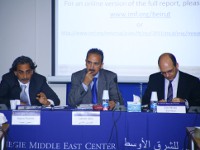Registration
You will receive an email confirming your registration.
At a Carnegie Middle East Center event, Eric Mottu of the International Monetary Fund (IMF) presented the IMF’s latest regional economic outlook report, “Mideast Countries See Opportunity Amid Unrest.” This report provides policy recommendations to tackle the Arab world’s economic challenges in a rapidly changing political sphere. Carnegie’s Lahcen Achy and Professor Simon Neaime of the American University of Beirut discussed the IMF’s recommendations and how the report responded to the new dynamics shaping the region.
Current Threats and Obstacles to Economic Recovery
Mottu noted that although the IMF had not anticipated the current uprisings in the region, its prescriptions tackled the economic roots of the current discontent.
- Threats to the economic recovery: The economic recovery is not only unevenly distributed between developed and emerging economies, Mottu said, it is also unbalanced between oil-exporting and oil-importing economies in the Middle East and North Africa (MENA). In the latter, the rise in oil and food prices has created inflationary pressures and strains on low wages. Moderate growth rates have so far been insufficient to lower unemployment levels. In the wake of the protests, tourism has dropped, harming Egypt and Tunisia’s economic recovery, Mottu added.
- Fiscal balance, subsidies, and finance: Public spending has substantially increased in the past years, mostly on social sectors and subsidies. Mottu warned that subsidies were generally not benefiting the groups in need and should be re-disbursed through new mechanisms for allocation. He also pointed out that lack of competition in the banking sector hinders access to finance for small- and medium-size enterprises.
Innovative Economic Solutions
Neaime expressed his disappointment at the report’s conclusions, stating that they do not sufficiently consider the new political context across the region.
- Same solutions: Neaime argued that the IMF report advocates for the same solutions as were being implemented before the uprisings. He argued that this is a mistake, since many of those solutions had hurt the MENA economies and thus had a role in fomenting the current discontent.
- Fiscal responses: The fiscal responses in the report to address the pressing social issues facing MENA were insufficient, Neaime said. He described them as “short-sighted,” only addressing the symptoms instead of the structural causes behind the current problems. He argued that overall MENA countries had made progress toward fiscal balance and low inflation—two of the IMF’s customary concerns. Neaime suggested redirecting the immense fiscal capacity of oil-exporting countries to promote a more inclusive redistribution both across the region and within individual oil-exporting nations.
- A new development model: According to Neaime, the MENA region stands at a crossroads. It must shift away from what he described as the standard neoliberal agenda—which he holds accountable for the current unrest—and move toward the implementation of a new approach that “would be more ‘holistic’ and integrate all social aspects.”
Policy Design Inclusiveness
Achy contended that only a politically inclusive approach to producing a comprehensive medium term economic strategy can positively impact the MENA countries.
- The concept of “growth inclusiveness”: The new IMF report addressed, for the first time, the concept of “growth inclusiveness,” which stresses that growth levels are not the ultimate goal, but that the redistribution of economic growth is also key. Achy praised this addition and called for determining more ways to assess growth inclusiveness, as current indicators often give no information on redistribution.
- Inadequate solutions: Achy described the report as advocating three main goals: job creation, reallocation of subsidies, and the promotion of access to finance for small- and medium-size enterprises. These goals, he argued, are not new. The absence of long-term development vision in the MENA region, the prevalence of corruption and weak governance have harmed employment even more than demographic growth, a lack of education and training tied to employment needs, and labor market rigidity.
- The crucial role of institutions: Achy stressed the importance of institutions in the implementation of a more inclusive model of development. “‘Inclusiveness’ is not just inclusiveness of the outcome but also inclusiveness during the policy design,” he stated, suggesting that a wide variety of groups and interests should be consulted. “Just as home-grown protests lead to political transformation, a home-grown movement can lead to economic transformation,” Achy concluded.
